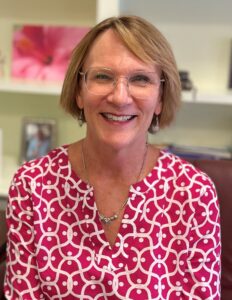
Karen Amirehsani – Congregational Nurse & Director of Sadye Bowles Fund
Many of us as children were never taught to identify or talk about our feelings or emotions, especially those perceived to be “unbecoming” or “unmanly.” Perhaps, you were taught to suppress your feelings or just “suck it up.” Maybe, you never had the opportunity to learn healthy coping strategies for managing challenging life events and were unconsciously taught that asking for help for mental health was “shameful.” In the U.S., we have seen rising rates of depression, anxiety, loneliness, and feelings of isolation. Additionally, there has been an increase in the use of substances, such as food, alcohol, prescriptive and illicit substances, and binging on social media, to numb feelings. The reality is that learning to talk about our feelings, developing effective coping strategies, and asking for help makes us stronger, more resilient, and promotes our overall well-being and quality of life. Our mental health is key to living the fulfilling lives we want to live—and the life God wants for us.
As a church family, we can provide a nurturing environment that promotes positive mental health for each age group. For children and youth, we can help them learn to identify their emotions, provide a safe place to talk about the stressors they are experiencing such as competition with academics or sports, bullying at school, feeling the need to please and live up to others’ expectations, pressure to get into certain universities, dealing with parental divorce/family dysfunction/traumatic events, and/or struggles with their sexual orientation.
We can do the same for adults, though the stressors may be different—being a parent, having a child with major health issues, developmental delays, or being on the autism spectrum, 24/7 career demands, being laid off, martial discord or divorce, experiencing major health issues, the death of a loved one, caring for your elderly parents, having a lifelong struggle with depression/anxiety yourself or possibly having the genetics for mental health disorders such as bipolar disorder, seasonal affective disorder, or schizophrenia. As we age, our bodies and health will change which can impact our mental health. Talking about mental health can make it easier for older adults to ask for support and seek professional help as they cope with the changes in their health and situation.
At FPC, we can offer educational opportunities to learn about the signs of mental health issues to promote early diagnosis and treatment, which can save lives. We can invite mental health experts to assist in teaching coping skills, setting boundaries, and teaching our youth and their parents and adults of all ages where they can go for professional help. It is never too early or too late to start these conversations and get help. We can also provide information on self-care and promote resilience and decrease the stigma around mental health. We recognize that everyone has a “story,” and that your journey is very personal and important. The Mental Health Ministry Team invites you on this journey with us as we begin to become more purposeful in promoting everyone’s mental health and decreasing the stigma surrounding it.
